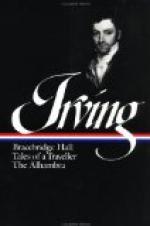The conversation during dinner was by fits and starts; breaking out here and there in various parts of the table in small flashes, and ending in smoke. The poet, who had the confidence of a man on good terms with the world and independent of his bookseller, was very gay and brilliant, and said many clever things, which set the partner next him, in a roar, and delighted all the company. The other partner, however, maintained his sedateness, and kept carving on, with the air of a thorough man of business, intent upon the occupation of the moment. His gravity was explained to me by my friend Buckthorne. He informed me that the concerns of the house were admirably distributed among the partners. “Thus, for instance,” said he, “the grave gentleman is the carving partner who attends to the joints, and the other is the laughing partner who attends to the jokes.”
The general conversation was chiefly carried on at the upper end of the table; as the authors there seemed to possess the greatest courage of the tongue. As to the crew at the lower end, if they did not make much figure in talking, they did in eating. Never was there a more determined, inveterate, thoroughly-sustained attack on the trencher, than by this phalanx of masticators. When the cloth was removed, and the wine began to circulate, they grew very merry and jocose among themselves. Their jokes, however, if by chance any of them reached the upper end of the table, seldom produced much effect. Even the laughing partner did not seem to think it necessary to honor them with a smile; which my neighbour Buckthorne accounted for, by informing me that there was a certain degree of popularity to be obtained, before a bookseller could afford to laugh at an author’s jokes.
Among this crew of questionable gentlemen thus seated below the salt, my eye singled out one in particular. He was rather shabbily dressed; though he had evidently made the most of a rusty black coat, and wore his shirt-frill plaited and puffed out voluminously at the bosom. His face was dusky, but florid—perhaps a little too florid, particularly about the nose, though the rosy hue gave the greater lustre to a twinkling black eye. He had a little the look of a boon companion, with that dash of the poor devil in it which gives an inexpressibly mellow tone to a man’s humor. I had seldom seen a face of richer promise; but never was promise so ill kept. He said nothing; ate and drank with the keen appetite of a gazetteer, and scarcely stopped to laugh even at the good jokes from the upper end of the table. I inquired who he was. Buckthorne looked at him attentively. “Gad,” said he, “I have seen that face before, but where I cannot recollect. He cannot be an author of any note. I suppose some writer of sermons or grinder of foreign travels.”




